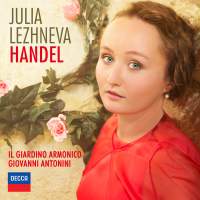Texte paru dans: / Appeared in: |
|
|
Outil de traduction ~ (Très approximatif) |
|
|
Reviewer: Joshua
Cohen The premise for this recital of early Handel arias composed in Italy lies in the pairing of an exceptionally talented young soprano with a great Baroque master, both captured in the early springtime of their respective international careers. Its inspiration, however, arises from Italy itself—or rather, its music, which has always drawn its primary nourishment from the fountainhead of pure song. Handel was the most cosmopolitan of Baroque composers: a musician of unparalleled versatility who (in the words of Thomas Beecham) “wrote Italian music better than any Italian; French music better than any Frenchman; English music better than any Englishman; and, with the exception of Bach, outrivaled all other Germans.” But it was during those three pivotal years in Italy (1707–09) that he began seriously to explore and refine the most precious of his many gifts—an extraordinary feeling for sensuously beautiful, indelibly memorable melody. Handel’s first stop was in Rome, which, as the booklet notes point out, “might not seem a propitious city” for a future opera composer, given that the Vatican prohibited public opera performances there. Yet Handel was able to find scope for his developing abilities in Il trionfo del tempo e del disinganno (The Triumph of Time and of Disillusionment, 1707), an allegorical oratorio portraying the efforts of Pleasure to seduce Beauty away from the path of virtues. Both roles (Pleasure and Beauty) are written for soprano, and Lezhneva sings two arias apiece for each of them, culminating in a serenely beautiful solo with violin obbligato, in which Beauty foreswears the path of path of passion and turns her thoughts to God. A second oratorio, La resurrezione, was produced the following year (on Easter Sunday in 1708), under the patronage of the Marquis Ruspoli, who also commissioned one of Handel’s strangest pieces, the Salve Regina: two concise, plaintive minor-key arias followed by a joyous allegro with an organ obbligato, and concluding with a rather mysterious sort of chant over hushed strings. Rounding off the program are a pair of arias from Handel’s first two bona fide Italian operas, Rodrigo (1707) and Agrippina (1709), and a winsome, captivating aria, “Felicissima quest’alma,” from his pastoral cantata Apollo e Dafne (begun in Venice but completed in Hanover in 1710). I’ve read glowing reports of Julia Lezhneva’s singing in public performances and on record, but had never heard her before receiving this disc for review. The booklet notes describe her as “precocious,” aptly enough for a singer who was 25 years old when she recorded this demanding program in January 2015, and who has been singing publically since she was 12. Her voice is a light lyric soprano of exceptionally pure timbre, but somewhat rounder and darker than other singers of her type, and having a slightly “hooded” quality characteristic of many Russian sopranos. Her intonation is flawless, and her command of fast coloratura remarkable. She also knows how to shape a melody for maximum sensual appeal, as in Dafne’s aria already mentioned or the gorgeous “Lascia la spina” (better known in its recycled form, “Lascia chio pianga,” from Handel’s 1711 opera Rinaldo). A few aspects of her singing are less satisfying. Lehzneva has a tendency to flatten out the vibrancy on sustained notes, producing a straight, keening sound that can sometimes glare. Even her quiet singing, lovely as it is, can leave one wishing for a little more spin and float in the sound. And while her Italian diction is generally clear, she hasn’t yet learned how to contour the words expressively. But some of the problems, I think, are the fault of the recording. Whether owing to the acoustics of the recording venue, microphone placement, or poor engineering, my ears pick up a metallic overlay to the recorded sound that does the singer no favors. Surfing the Internet for other live and studio performances in different venues, I hear the same voice produced with more vibrancy and color, even with a bit more life in the words. No doubt Lezhneva will become an even finer artist in years to come, but on the evidence of her best recordings, she’s already a singer of charm and distinction, well beyond the stage of mere “precociousness.”
Despite my reservations about
the recording, I recommend this CD as a fascinating selection of Handel’s
early works, and as a technically flawed but still appealing document of a
lovely young singer at the beginning of what one hopes will be a long and
rewarding prime. | |
|
|
|
|
Cliquez l'un ou l'autre
bouton pour découvrir bien d'autres critiques de CD |
|




